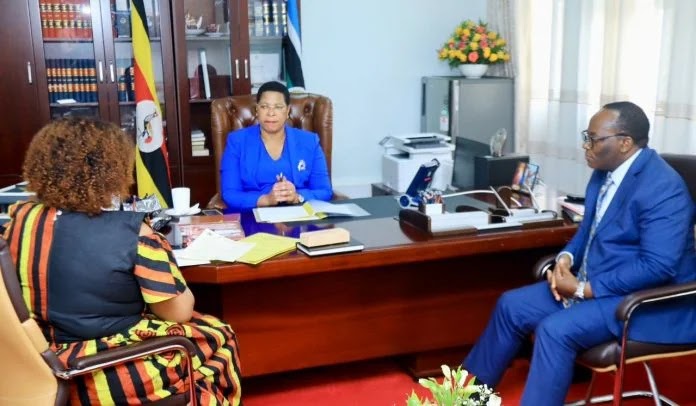Kampala, Uganda: A tense atmosphere engulfed the meeting on Monday morning as Speaker of Parliament Rt. Hon. Anita Annet Among and the Leader of Opposition Rt. Hon Mathias Mpuuga interrogated Uganda Human Rights Commission (UHRC) Chairperson Mariam Wangadya.
The purpose of the meeting, initiated by Among, was to address growing concerns about Wangadya’s leadership and the perceived inefficiency of the UHRC in addressing human rights violations in Uganda.
The Opposition, led by Mathias Mpuuga, expressed a lack of confidence in both Wangadya and the UHRC. Mpuuga criticized Wangadya for perceived incompetence and the commission’s failure to produce reports condemning human rights abuses by the government.
Speaker Among also questioned the absence of UHRC Commissioners during the important meeting and demanded concrete evidence of human rights violations.
Wangadya’s Defensive Response.
Wangadya responded to the accusations by adopting a defensive stance. She acknowledged the importance of evidence but pointed out the limitations of the UHRC’s mandate in investigating criminal cases.
To support her argument, she mentioned the commission’s thorough investigation into missing persons, stating that they have already completed their role in this matter.
Furthermore, Wangadya explained that she was the only commissioner present due to various reasons. Some commissioners were ill, while others were attending tribunals in different parts of the country.
Not pleased with the explanation, Speaker Among expressed doubt in Wangadya’s ability to fulfil her duties as UHRC Chairperson citing the shrinking civic space in Uganda as evidence.
According to the speaker, Wangadya’s response further raised concerns about the UHRC’s effectiveness, as she referred to the Parliament’s Human Rights Committee’s investigation into missing persons. This means by now if the UHRC doesn’t have its independent report, they have been redundant and neglecting its responsibilities.
What Other Commissioners Say!
Some commissioners denied the existence of tribunals when The Standard contacted them, claiming that only Wangadya is authorized to hold such proceedings.
“The tribunal cannot take place because it is chaired by her and the current commission does not have any frail or sick commissioners, unlike the previous one which included Etima, Katebalirwe, Justice Tinyinondi, Tecla Kinalwa, and Adrian Ssibo,” one of the charged commissioners said.
Another Commissioner has reportedly accused Wangadya of reportedly undermining fellow commissioners.
“She is a joke! and a poor administrator. Just imagine that recently the President had arranged a meeting with the Commission but was surprised to find her alone, without any commissioners present. The President was left in shock and specifically requested a full Commission for the meeting,” another commissioner said.
Meanwhile, we’ve learnt that the meeting was marred by a lack of transparency, with only two television crews granted access.
Additionally, key stakeholders such as representatives from the Uganda Police Force, Government Communication Office, and Ministries of Defense and Internal Affairs were conspicuously absent, leaving critical questions unanswered and hindering a comprehensive discussion.
Follow-up Meeting with Uncertain Outcomes:
Despite the tense atmosphere and unresolved issues, the meeting concluded with an agreement to hold a follow-up session. This next meeting will involve all UHRC Commissioners and relevant government officials, raising hopes for a more thorough and productive dialogue.
However, the effectiveness of this follow-up remains to be seen, as Wangadya’s leadership and the UHRC’s overall performance continue to face scrutiny and doubt.
Key Concerns and Uncertain Future:
Erosion of trust: The opposition’s lack of confidence in the UHRC and its leadership highlights a critical trust deficit that requires immediate attention.
Demand for accountability: Parliament’s demand for concrete evidence against the government raises questions about the UHRC’s independence and objectivity.
Neglecting core duties: The shrinking civic space suggests that the UHRC under the leadership of Wangadya is failing to fulfill its primary responsibility of protecting and promoting human rights in Uganda.
Lack of transparency: The restricted media access during the meeting raises concerns about the UHRC’s transparency and its commitment to public accountability.
The tense meeting between Parliament and the UHRC has cast a long shadow over the future of human rights in Uganda. The upcoming follow-up meeting will be crucial in determining whether the UHRC can regain its credibility and effectiveness, or whether it will remain mired in controversy and accusations of incompetence under Mariam Wangadya’s leadership.
Opposition’s Lack of Confidence
Opposition leader Mathias Mpuuga expressed a complete lack of confidence in the UHRC, citing Wangadya’s perceived incompetence and the commission’s failure to produce reports criticizing the government. Among echoed these sentiments, demanding concrete evidence of human rights violations and questioning Wangadya’s absence of Commissioners during the meeting.
UHRC’s Defense:
Wangadya defended the commission’s work, emphasizing their need for evidence and the limitations of their mandate in investigating criminal matters. They cited their exhaustive inquiry into missing persons and argued that they are functus officio on the matter.
The meeting concluded with an agreement to hold a follow-up session with all UHRC Commissioners and relevant government officials. This next meeting is expected to be more comprehensive and address the concerns raised by the Parliament.
Future Implications:
The tense meeting between Parliament and the UHRC underscores the ongoing debate about human rights in Uganda. The next meeting will be crucial in determining the future of the UHRC and its effectiveness in addressing human rights violations in the country.





















0 Comments